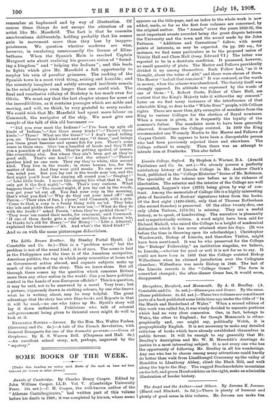SOME BOOKS OF THE WEEK.
[Under this heading we notice such Books of the week as have not been reserved for reciew in other forms.]
Annals of Cambridge. By Charles Henry Cooper. Edited by John William Cooper, LL.D. Vol. V. (Cambridge University Press. 18s. net.)—C. H. Cooper, the well-known author of the "Athenae Cantabrig,ienses," had written part of this volume before his death in 1868; it was completed by his son, whose name appears on the title-page, and an index to the whole work is now added, made, so far as the first four volumes are concerned, by the original author. The " Annals " cover the years 1850-56, the most important events recorded being the great dispute between the University and the town and the award made by Sir John Patteson. "Additions and Corrections" follow, with many points of interests, as may be expected. On pp. 280 seq., for instance, we find some particulars as to the proposed union of Trinity Hall and Clare Hall (temp. Edward VI.) The latter was reported to be in a destitute condition. It possessed, however, no small quantity of plate. The Master and Fellows providently divided it up among themselves. Each Fellow had, "as it is thought, about the value of .210," and there were eleven of them. The Master "had all that remained." It was restored, or the worth in money, when the scheme was abandoned. The Society itself was strongly opposed. Its attitude was expressed by the words of one of them : "I, Robert Coote, Fellow of Clare Hall, am content that the King's Majesty take it withowthe my consent." Later on we find many instances of the interference of that admirable King, so dear to the "White Rose" people, with College rights. There are more than fifty examples of mandates from the King to various Colleges for the election of Royal nominees. When a reason is given, it is frequently the loyalty of the nominee's father. The mandates seem to have been generally observed. Sometimes the College resisted. In 1669 the King recommended one Wormely Martin to the Master and Fellows of Corpus Christi. He appears to have been a disreputable person who had been previously rejected there and elsewhere. The College refused to comply. Then there was an attempt to intrude him at Pembroke. This also failed.






































 Previous page
Previous page